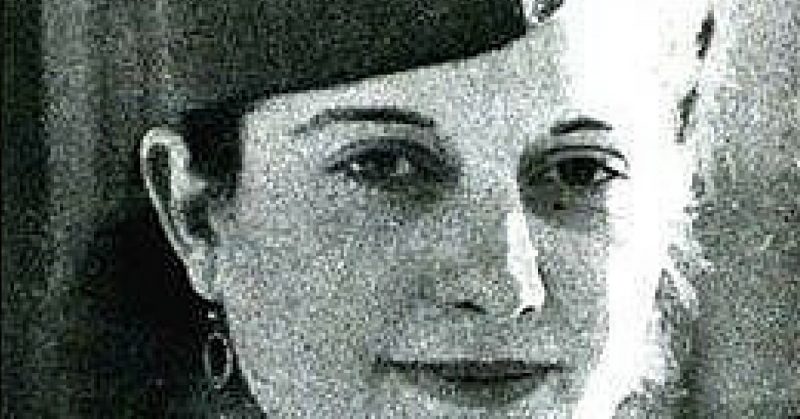Jeannette Guyot was born on February 26, 1919, in Chalon-sur-Saône. In June 1940, when France fell to Germany, she joined the Resistance with the rest of her family. She worked as a passeur or guide for Félix Svagrowsky of the Amarante network, smuggling people out of occupied France into Vichy France across the Saône river.
Guyot met Gilbert Renault, also known as Colonel Rémy, chief of the Paris-based Confrérie Notre-Dame réseau (network) in August 1941 and became one of his liaison officers, carrying mail into Vichy France while continuing to work as a passeur.
In February 1942, she was arrested and imprisoned for three months at Chalon-sur-Saône and Autun. She resisted interrogation and nothing could be proved against her. Still, the Germans withdrew her identity papers. She continued as a passeur anyway, helping a dozen people a month across the border.
In June 1942, Colonel Rémy’s network was betrayed by Pierre Cartaud and many of the members were arrested. Guyot fled to Lyon, where she met Jacques Robert. He had been trained in special operations in England to work for de Gaulle’s Free French. He had parachuted into France to establish the “Phratrie” réseau.
Phratrie was considered the “most extraordinary” of all the Free French networks by Colonel André Dewavrin, chief of de Gaulle’s central bureau for intelligence and action. It had several subgroups whose activities included intelligence-gathering, sabotage, and helping downed Allied airmen and French civilians to escape from France.
When the Germans occupied Vichy France, the Gestapo went after Guyot. On May 13, 1943, she and Robert were picked up in a rescue operation by a Lysander of the Royal Air Force’s 161 Squadron.
The next morning in London, Guyot met Colonel Rémy (who had escaped by boat across the Channel). She formally enlisted in the Free French forces under the alias Jeannette Gauthier. Rémy assigned her to a desk job, but she insisted on being sent back to France. He eventually agreed and sent her to Praewood House, St. Albans, to be trained in military intelligence techniques by SIS and OSS instructors.
The training was preparation for Plan Sussex, which involved parachuting observation teams into France during and after the Allied landings in Normandy. The teams were to report on the movements of German troops and order of battle. In January 1944, Guyot was awarded her parachute wings.
Bad weather delayed her deployment until February 8, 1944, when she landed with three other French officers near Loches, southeast of Tours, in Operation Calanque. They were tasked with finding drop zones and safe houses for more than 50 follow-up Sussex teams. They faced increased danger as part of the pathfinder team with the Gestapo becoming more active and German radio detection improving. They still managed to arrange 20 dropping zones and about 100 safe houses.
In Paris, Guyot asked a cousin to hide her team’s radio operator at the Café de l’Electricité at 8 Rue Tournefort in Montmartre.
As Mme Andrée Goubillon, the owner, later told the BBC, “I knew which kind of work she had come to make, and when she asked me… if I were ready to help her, I answered yes without the least hesitation. Although the café was located beside an office of the Gestapo, I knew what I wanted to do, I was not afraid.” After the war, the café was renamed Café des Sussex.
Guyot frequently traveled throughout France carrying luggage that would have gotten her tortured and executed had been searched. The information returned to England by the team was better than expected, but ten agents lost their lives.
When France was liberated, Guyot was assigned clerical duties in the French intelligence service. She learned that her father, Jean-Marie, a timber merchant, had been deported to Germany in 1944 and had died at Cham in Bavaria. Her mother, a seamstress, was deported to Ravensbrück, where tens of thousands of women were murdered. The elder Guyot survived and was among 300 French women whose freedom was sold to the Swiss Red Cross in April 1945.
In June 1945, Guyor retired to Sevrey, where she married Marcel Gaucher, another Sussex agent.
Guyot was made a Chevalier of the Legion d’honneur and was awarded the Croix de Guerre avec palmes (Cross of War). She was one of two women awarded the American Distinguished Service Cross, the second-highest American award after the Medal of Congress. She was also awarded the British George Medal.
The citation stated that she had shown the highest qualities of initiative, daring, and endurance and that she was unquestionably the heroine of special operations on the Western Front. She took the riskiest of assignments, and her work and conduct were above all praise.
She led a quiet life after the war, forgoing publicity. She gave her papers and medals to a grand-daughter.
She is survived by two daughters and a son.
Source: http://www.telegraph.co.uk/obituaries/2016/04/26/jeannette-guyot-intelligence-agent–obituary/
Image by By Bundesarchiv, Bild 183-J27289 / Koll / CC-BY-SA 3.0, CC BY-SA 3.0 de, https://commons.wikimedia.org/w/index.php?curid=5434465
